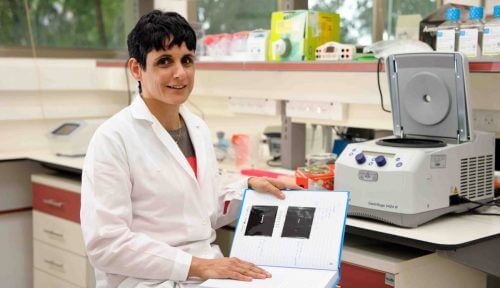Scientists from the Weizmann Institute have discovered a protein whose blockade may slow the progression of some types of cancer

To understand what goes wrong in our body in cancer, it is sometimes useful to deviate from the main road and turn to side roads. Dr. Ayelet Erez from the Department of Biological Control at the Weizmann Institute implements this approach through research on rare childhood diseases. "Cancer usually involves dozens - if not hundreds - of mutations, and sorting out the various roles and defects that directly result from each mutation is an almost impossible task. On the other hand, many rare childhood diseases are caused by a mutation in a single gene," explains Dr. Erez who, in addition to her work as a scientist, also treats cases of family cancer as part of her training as a clinical geneticist. According to this approach, children with rare genetic diseases caused by a mutation in a single gene can serve as model cases in our attempt to understand the role of that particular gene in complex diseases such as cancer. In this way, they discovered in Dr. Erez's laboratory a protein, the blocking of which may slow down the progress of some types of cancer.
The group's findings place their work in a new field of research - "metabolism of cancer", which seeks to identify disturbed or uncontrolled processes of metabolism that are unique to cancer in order to stop the development of the disease in the body.
Previous research on the genetic childhood disease citrullinemia type I allowed Dr. Erez and her group to understand that cancer cells depend on aspartic acid to divide. In children born with this disease, the ASS1 gene is defective, which, despite its essentiality for normal cell function, is found to be silenced in an aggressive and difficult-to-treat type of cancer. Since aspartic acid is needed for the function of ASS1, Dr. Erez and her team hypothesized and proved that silencing ASS1 expression in cancer allows the overutilization of aspartic acid by another enzyme for the construction of DNA and RNA, which are essential for the division and growth of cancer cells.
Cancer usually involves dozens - if not hundreds - of mutations, and sorting out the various functions and defects that directly result from each mutation is an almost impossible task. In contrast, many rare childhood diseases are caused by a mutation in a single gene"
Later, the research group examined children who suffered from type II citrullinemia, in which the gene for the production of the citrin protein, which is responsible for transferring aspartic acid both for ASS1 use and for the construction of nucleic acids, is defective. Children with this disease tend to be smaller than average and avoid eating sweets, and the study did show that this protein is essential for cancer cells to produce DNA and RNA and to break down glucose. It is interesting to note that the dependence on citrin for cell division and growth was observed both in cancer types where ASS1 is expressed and in types where the protein is not expressed.
Dr. Erez and her research team realized that citrin - the protein that helps regulate growth in childhood - may be a possible target for anti-cancer treatments because the growth and division of cancer cells depends on glucose and the production of nucleic acids. Based on the identification of the region essential for the function of the protein in children with citrullinemia type 2, the research group is developing a molecule that will block its function in cancer. Preliminary results show that blocking citrin in cancer cells reduces the supply of aspartic acid to the cancer cells and slows their growth. "ידע", the applications arm of the Weizmann Institute, is working with Dr. Erez to advance the research, so that it can be turned into a biomedical application.
